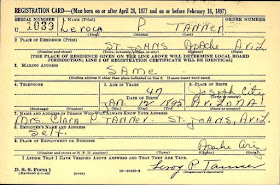The answer to the question in the title of this post requires some basic genealogical definitions. First, the term "source" is used to refer to the place where the information used to establish the existence of an event in an ancestor's or relative's life is located or available. Here is an example of this definition.
My Grandfather was born on 12 January 1895. Now, I am asserting that the event of his birth took place on that particular day in 1895. Where did that information come from? Where would I go to verify that someone copied the information correctly or that there is some reasonable basis for believing that the date is correct?
Back in 1895, there were no birth certificates in Arizona where he was born but in 1942, my Grandfather filled out a World War II Draft Registration card and entered his birth date. Here is the card.
Where can this card be found other than adding a copy of the card to my record in my own pedigree? Here is the citation to the location of the card online:
Arizona, military records : World War II 4th draft registration cards, 1942
Authors:
United States. Selective Service System (Main Author)
National Personnel Records Center (St. Louis, Missouri) (Repository)
Format:
Manuscript/Manuscript on Digital Images
Language:
English
Publication:
Salt Lake City, Utah : Genealogical Society of Utah, 2015
I can also add in the link to the digital copy. See https://www.familysearch.org/ark:/61903/3:1:3Q93-C9YJ-T3P6-3?personaUrl=%2Fark%3A%2F61903%2F1%3A1%3AQKC4-S97J
The "citation" is the written description of the location. By the way, there is a huge genealogical culture of having the "correct" form of citations.
So, when we talk about adding sources to your own genealogical records, what we really mean is: tell us where you got the information.
Now, suppose your "source" is you personal information. That is the source. But in real life "personal information" is not usually reliable or accurate. So, we would like to have more than just what you think is correct or what you were told by your family members or others. The simplest way to "refine" your personal knowledge as a source is to do some research and find a record or other written document that collaborates your personal knowledge.
The process is pretty straight forward. You look for records or documents that contain information about your ancestors and then you use the information you find to make entries in your family tree at the same time recording the location where you found the information. No information = No entry. In this, saying that you "know" the information is correct is unacceptable. Without some substantiating document or record you do not know anything and without telling the rest of us where you found the information, we are very unlikely to believe that your information is correct.
That's why we need a source for every piece of information in the anyone's family tree.



On the other hand, I attended my father's funeral, of course, and recorded the date on FamilySearch Family Tree with the day, month, and year which occurred in 1984. Last week a cousin changed the burial date by taking off the day, leaving just the month and year. Source cited was FindAGrave. In this case, my personal knowledge was more complete than the FindAGrave source. So, it depends.
ReplyDeleteOf course, you can correct the entry but the idea here is that your "source" is your explanation about where you got the information. You can also provide a burial date from cemetery records and mortuary records. I am not saying that personal information is not valuable, it just needs to be explained and identified so we know if you recorded the original date or if you heard about it from your great aunt.
Delete